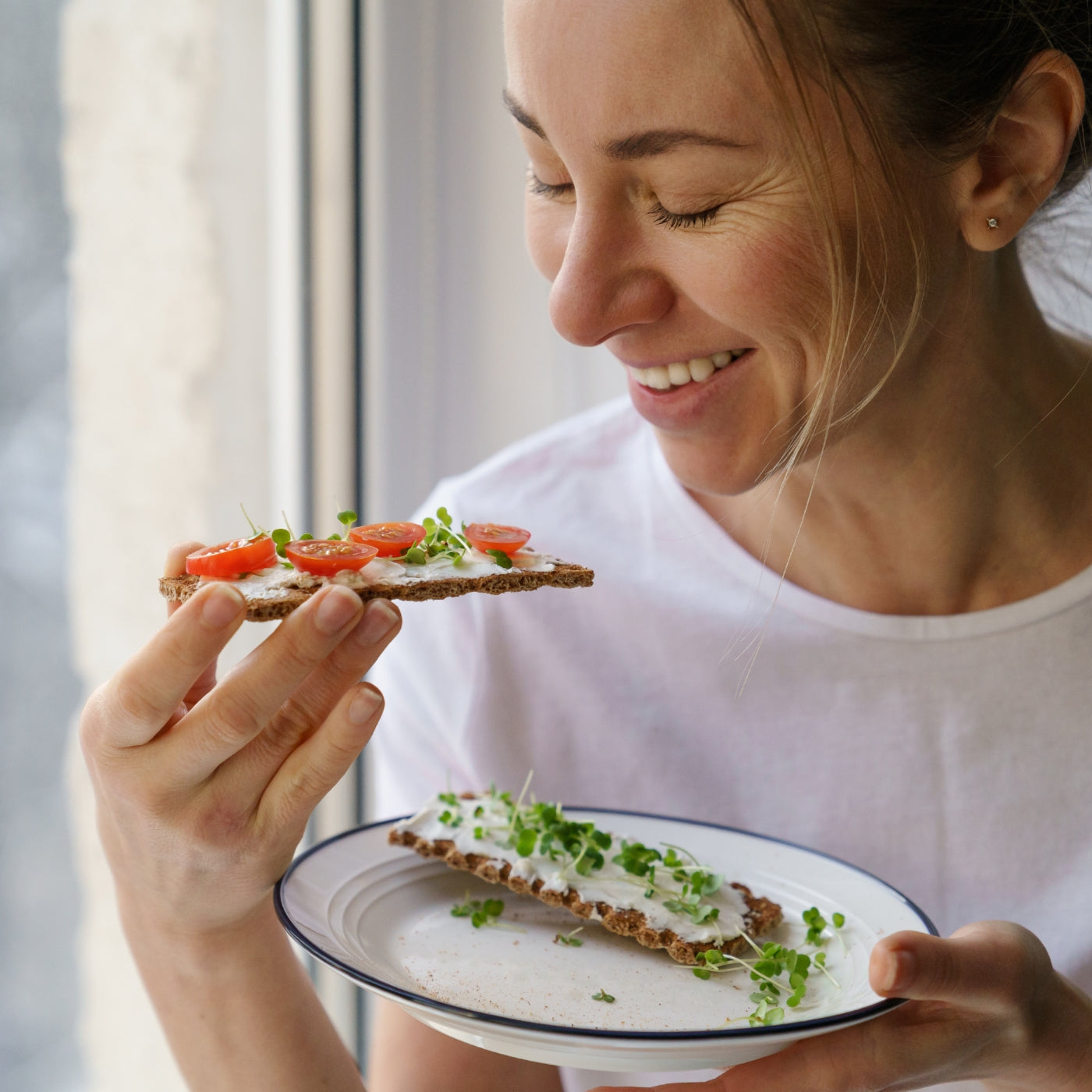
Ever heard the saying, “You are what you eat”?
While it may have been a slight exaggeration by your parents when they threatened you would turn into a giant cupcake from eating too many, it is the truth that your diet is going to reflect directly in your body’s health.
Whilst many of us are conscious about our food intake when it comes to our waistlines, a healthy skin diet is also hugely important when it comes to getting gorgeous, healthy, glowing skin.
Let’s talk about 12 tips and foods that will support healthy skin, no matter your age. The science doesn't lie!
1. Omega-3 fatty acid
Essential for keeping your skin thick, supple and moisturised, omega-3 fatty acids can be found in oily fish, such as salmon, mackerel and herring, as well as linseed, walnuts and chia seeds. Additionally, you can of course supplement with omega-3 supplements, such as fish oil or tablets. Our bodies do not produce omega-3 itself, so it is imperative we supplement it in our diet.
Studies have also shown that omega-3 fatty acids can reduce inflammation in your skin, reducing redness and acne, and can even make your skin less sensitive to harmful UV rays.
2. Vitamin E
Numerous studies indicate that Vitamin E is an important antioxidant that will help to protect your skin from oxidative damage caused by sun and the environment, as well as aging in general.
You can find it in fatty fish, avocado, almonds and sunflower oil.
3. Vitamin C
We mention this one next because, interestingly, Vitamin E seems to work best when combined with Vitamin C.
By its own right, Vitamin C is important for helping your skin to create collagen, keeping your skin structurally strong and healthy, as well as promoting brightness and helping to heal blemishes properly. The best sources are blueberries, broccoli, kiwi fruits, oranges, strawberries and sweet potatoes.
4. Selenium
Perhaps not as well known, selenium is a powerful antioxidant that works alongside other antioxidants such as vitamins E and C and is essential to support the immune system.
Studies suggest that a selenium-rich diet can help to protect against skin cancer, sun damage and age spots. One way to boost your intake is to eat Brazil nuts. Just four nuts will provide the recommended daily amount!
Other good sources are fish, shellfish, eggs, wheatgerm, tomatoes and broccoli.
5. Low GI carbohydrates
A low GI (glycaemic index) carbohydrate is going to slowly release glucose into your system, providing a steady supply of energy, and longer satiation.
Try to eat plenty of beans, pulses, porridge and other low-GI carbohydrates.
Avoid high-GI carbohydrates like biscuits and sugary drinks, as they lead to the production of insulin, which may damage collagen and accelerate wrinkles.
6. Zinc
Zinc is involved in the normal functioning of the sebaceous glands in the skin (which produce oil) and helps to repair acne and keep skin soft and supple.
Zinc-rich foods include fish, lean red meat, wholegrains, poultry, nuts, seeds and shellfish.
7. Beta carotene
Beta carotene is a nutrient found in plants, and functions as provitamin A, which means it can be converted into vitamin A in your body.
Beta carotene is found in oranges and vegetables such as carrots, spinach, and sweet potatoes.
Sweet potatoes are an excellent source — one 1/2-cup serving of baked sweet potato contains enough beta carotene to provide more than six times your daily requirements of vitamin A.
Carotenoids like beta carotene help keep your skin healthy by acting as a natural sunblock.
When consumed, this antioxidant is incorporated into your skin and helps protect your skin cells from sun exposure. This may help prevent sunburn, cell death, and dry, wrinkled skin.
Interestingly, high amounts of beta carotene may also add a warm, orange colour to your skin, contributing to an overall healthier appearance.
8. Sulforaphane
Sulforaphane boasts some impressive potential benefits, including acting as a powerful protective agent against sun damage, neutralizing harmful free radicals and switching on other protective systems in your body. Studies have also shown it may help to maintain collagen levels in your skin. It may even have anti-cancer effects, including on some types of skin cancer.
One of its best sources is broccoli, which is also full of many vitamins and minerals important for skin health, including zinc, vitamin A, and vitamin C.
It also contains lutein, a carotenoid that works like beta carotene. Lutein helps protect your skin from oxidative damage, which can cause your skin to become dry and wrinkled.
9. Isoflavones
Found in soy, isoflavones are a category of plant compounds that can either mimic or block estrogen in your body.
Isoflavones may benefit several parts of your body, including your skin.
One study involving middle-aged women found that eating soy isoflavones every day for 8–12 weeks reduced fine wrinkles and improved skin elasticity.
In postmenopausal women, soy may also improve skin dryness and increase collagen, which helps keep your skin smooth and strong.
These isoflavones not only help to protect the cells inside your body from damage but also your skin from UV radiation — which may reduce the risk of some skin cancers.
10. Drink plenty of water.
You’re probably sick of hearing how many glasses of water you should be drinking a day.
But one good reason for staying hydrated is your skin needs moisture to stay flexible. Even mild dehydration will cause your skin to look dry, tired and slightly grey.
Drink six to eight glasses of water a day – all fluids count towards your daily allowance, but water is the best. Herbal, caffeine-free teas are good too.
Don’t forget that some fruit and vegetables, such as watermelon, zucchini and cucumber, also contribute fluids – the added benefit is that the minerals they contain will increase the rate you hydrate your body and skin.
Two things to avoid:
If you are looking to keep your skin looking bright, youthful and clear, try to limit your intake of:
-
Alcohol: The biggest way alcohol is detrimental to the health of your skin is dehydration. Wrinkles and pores become more prominent, and your skin will lose its natural plumpness, looking dry and dull. It can also increase the likelihood of rosacea, as well as causing inflammation.
- Sugary foods: Sugar is only going to do harmful things to your entire body, but for your skin in particular, it has been shown to damage collagen production, increases inflammation, and speed up aging.
